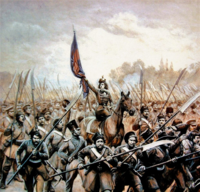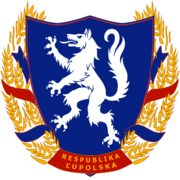Marš Pobiede
| English: March of the Lémanites Listen | |
|---|---|
 Marija Léman leads her followers, the titular Lémanites, into battle during the Luepolan Uprising of 1818 | |
National anthem of | |
| Lyrics | Slobodăn Ković, 1818 |
| Music | Laurens van Overhus, 1837 |
| Adopted | 1838 1979 (by the |
March of the Lémanites (Luepolan: Marš Lémanki [ˈmaɾʃ le:ˈmanki]) is the national anthem of Luepola. Its lyrics were written by Slobodăn Ković in 1818, in the form of a poem that was later adopted as a popular song among the Luepolan populace, who had overthrown the Luepolan king Ratimir II. Various composers of the era composed renditions of the poem, but the composition by the Borish composer Laurens van Overhus became the most popular rendition; his composition together with a slightly altered form of the lyrics was formally chosen as the anthem of Luepola by the Sliet in 1838.
Official uses
Luepolan radio and television stations, by convention, play the anthem at the start and end of their daily broadcasts if the station does not broadcast 24/7. 24/7 stations instead play the anthem at 8:00 AM and 8:00 PM. The first stanza of the anthem is also sung at most official events involving the government or an otherwise national organization.
Lyrics
Luepolan lyrics |
Phonetic transcription (IPA) |
Translation |
Gore i poľa, život i krasa, |
[ˈgɔɾe i ˈpɔʎe
ˈʒivɔt i ˈkɾasa] |
Mountains and fields, nature and beauty, |
Marš, marš, Lémanki, |
[ˈmaɾʃ ˈmaɾʃ le:ˈmanki] |
March, march, Lémanites, |
Song of the Prishekers
A derivative of Marš Lémanki, most popularly known as the Song of the Prishekers (Luepolan: Piesăň Priške) was adopted by the Communist Party of Luepola as its anthem in 1892, and became a popular song of protest among the many Luepolans dissatisfied with the reigning government. It became the country's national anthem following Lev Gincburg's consolidation of power in the newly-established People's Republic of Luepola. The song was later translated into many other languages, as Flecquism spread globally.
